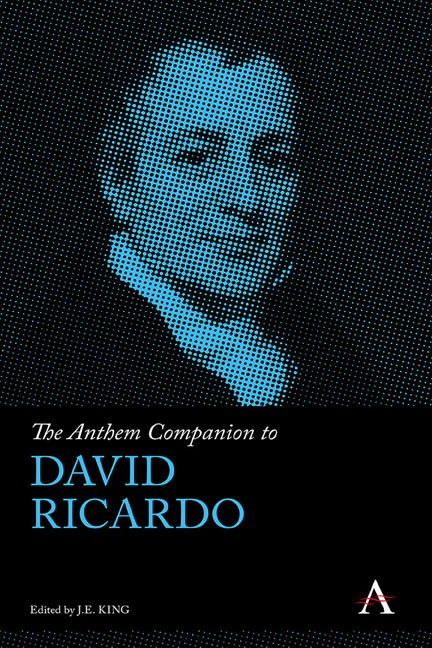Book contents
- Frontmatter
- Contents
- Notes on Contributors
- Chapter 1 Introduction
- Chapter 2 On Some Myths about Ricardo’s Theory of Money
- Chapter 3 Ricardo on Foreign Trade
- Chapter 4 ‘A Tolerably Correct Law Respecting Proportions’: Ricardo on Income Distribution
- Chapter 5 Ricardo on Economic Policy
- Chapter 6 (Mis)Interpreting Ricardo
- Chapter 7 Ricardo’s Business Activities
- Chapter 8 Political Economy ‘Through a Glass Hive’? The Encounter of Ricardian Ideas with Nineteenth-Century Australia
- Chapter 9 Ricardo and Classical Political Economy
- Chapter 10 Ricardo and Marx
- Chapter 11 Malthus and Ricardo on the Dismal Science
- Further Reading
- Index
Chapter 3 - Ricardo on Foreign Trade
Published online by Cambridge University Press: 17 October 2023
- Frontmatter
- Contents
- Notes on Contributors
- Chapter 1 Introduction
- Chapter 2 On Some Myths about Ricardo’s Theory of Money
- Chapter 3 Ricardo on Foreign Trade
- Chapter 4 ‘A Tolerably Correct Law Respecting Proportions’: Ricardo on Income Distribution
- Chapter 5 Ricardo on Economic Policy
- Chapter 6 (Mis)Interpreting Ricardo
- Chapter 7 Ricardo’s Business Activities
- Chapter 8 Political Economy ‘Through a Glass Hive’? The Encounter of Ricardian Ideas with Nineteenth-Century Australia
- Chapter 9 Ricardo and Classical Political Economy
- Chapter 10 Ricardo and Marx
- Chapter 11 Malthus and Ricardo on the Dismal Science
- Further Reading
- Index
Summary
Among David Ricardo's theoretical developments, one is still accepted today, while also the subject of recurring discussions: his views on international trade. These views, however, are most of the time not reported in their complexity but reduced to what was called later the ‘principle of comparative advantage’, allegedly stated in a few paragraphs of the chapter ‘On foreign trade’ of his Principles of Political Economy and Taxation. Taken out of the context of this chapter and of his other writings as well – and seemingly playing no role in the rest of the book – this ‘principle’ became the basis of international trade theories.
As will be seen, however, the so-called ‘principle of comparative advantage’ is a questionable interpretation of Ricardo's text. Ricardo's writings, admittedly, are sometimes ambiguous and he himself recognised this: ‘My speaking is like my writing too much compressed’, he wrote to Malthus (VI: 335). ‘I am too apt to crowd a great deal of difficult matter into so short a space as to be incomprehensible to the generality of readers’. Over the last few decades, however, his works have been the subject of more accurate readings, which show both that the traditional interpretation of this ‘principle’ is flawed and that a more faithful interpretation is possible. This chapter analyses the basic features of both interpretations, their main points of disagreement and their logical consequences. It will be seen that the alleged ‘principle’ is no principle at all: it cannot form the basis of any specific economic policy trying to influence the direction of trade, and the benefits a country receives from its participation in international exchanges are just the unintended consequences of the decisions of the many individuals who, in markets, only act for their own benefit.
Prelude. Ricardo's Text
In his chapter on foreign trade, Ricardo introduces an exchange between two countries, England and Portugal, each being able to produce two commodities: cloth and wine. The costs of production of these commodities are given in each country: Portugal requires 80 and 90 units of labour per year, respectively, to produce wine and cloth, while England requires 120 and 100 units of labour per year respectively.
- Type
- Chapter
- Information
- The Anthem Companion to David Ricardo , pp. 29 - 50Publisher: Anthem PressPrint publication year: 2023



